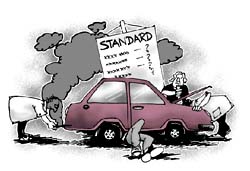Diesel vs Cars Environment
 the us-based Union of Concerned Scientists (ucs) have taken the petrol vs diesel debate head on in view of the public health implications of the expanding diesel market share following rising diesel car sales in the country. The organisation is dedicated to the advance of responsible public policies in areas where science and technology play a critical role. In a recently published report "Diesel Passenger Cars and the Environment', ucs informs, "Collectively diesel-powered vehicles account for nearly three quarters of all direct particulates from us transportation and over half of all nitrogen oxides (nox) a precursor to both smog and fine particles. Urban smog is emerging as the paramount problem. '
the us-based Union of Concerned Scientists (ucs) have taken the petrol vs diesel debate head on in view of the public health implications of the expanding diesel market share following rising diesel car sales in the country. The organisation is dedicated to the advance of responsible public policies in areas where science and technology play a critical role. In a recently published report "Diesel Passenger Cars and the Environment', ucs informs, "Collectively diesel-powered vehicles account for nearly three quarters of all direct particulates from us transportation and over half of all nitrogen oxides (nox) a precursor to both smog and fine particles. Urban smog is emerging as the paramount problem. '
Jason Mark and Candace Morey, the transportation analysts of ucs and the authors of the report, have compared the emission profile of vehicles running on these two fuels and the available emission control technologies. They have shown that the diesel vehicles still have a long way to go as far as controlling particulate emissions is concerned, and at the current level of technology development, diesel is harmful to public health. Although currently the diesel passenger cars make up a modest 0.1 per cent of automobile sales in the us, the authors express concern that if diesel engines capture a large share of the car and light truck market, the impact of diesel engines could increase. Developing a diesel passenger vehicle that meets the new California emission standards, the most stringent norms for diesel vehicles in the world, will require over a 90 per cent reduction in nox and a 75 per cent reduction in particulate matter (pm) over the next few years. According to the authors, this is tough as many experts view research on diesel emission reduction to be "high risk'. This is because research involves heavy investment and they are not certain whether the desired results will be achieved within the stipulated timeframe.
Laboratory tests indicate that substantial reductions in diesel vehicle emissions are possible under a scenario of maximum technical success. It is much less certain that these major reductions will be achievable in production vehicles operating under real conditions.
"As far as emission standards are concerned, while pollution from diesel passenger vehicles has been cut by a factor of 5-10 over the past two decades, it must be reduced by a factor of 10 within the next few years in order to meet near-term pollution standards. The engineering, economic and infrastructure challenges are large and will require a very high degree of technical success,' conclude the authors.
A detailed assessment of all technical options available to reduce pm and nox emissions from diesel vehicles
Related Content
- Policy Brief: Strategy for Inspection of On-Road BS-VI Vehicles
- Why Uber should go electric?
- New diesels, new problems
- 33m polluting cars still on EU roads after Dieselgate scandal
- New European emissions limits for cars risk triggering influx of ‘fake electric’ vehicles, green group warns
- Order of the National Green Tribunal regarding a park in Delhi being used for organizing events illegally, 03/12/2018
